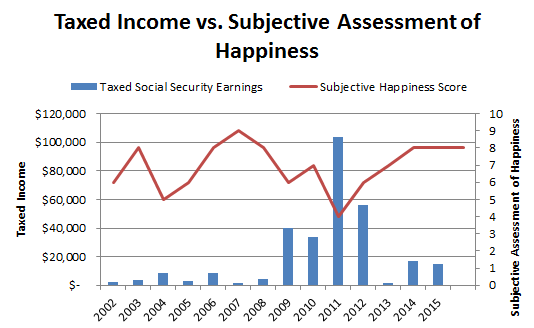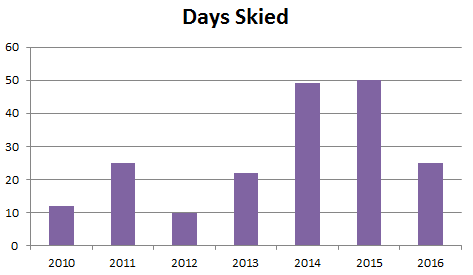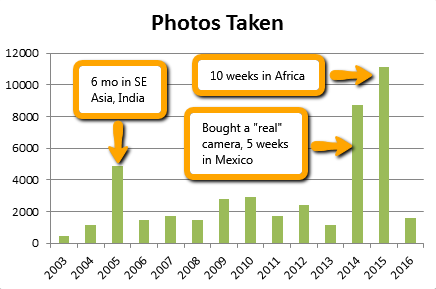A letter arrived yesterday from the Social Security Administration. Making an exception to my usual mail-handling approach of letting letters wither, unopened, in a heap, I opened this government agency notice hastily. Instead of the bad news I expected (“Dear Mr. Egge, your Social Security Number has been revoked!” or, more probably, “Dear Mr. Egge, you owe us money!”), inside I found a notice of my paid social security taxes, and a promise that, someday, should I become disabled or retired, I will receive payments in kind. Nice!
I also found in this charming little missive a yearly summary of my entire taxed earning history. Apparently, yes, someone is tracking these things! Here the mail randomly brought me a document created by a government agency with fourteen years of information about my earnings. Being the data nerd that I am, I immediately entered this data into a spreadsheet and began creating charts.What correlations or insights might I find?!
But first: a brief digression into the ebb and flow of happiness through changing circumstance and the passage of time since becoming a sentient being (which I consider to have occurred for me at around the age 16). My last years of high school were golden. Breaking up with my high school girlfriend and starting college brought me bitterly low. Going abroad my sophomore year restored me. I returned with a new-found sense of self, and enjoyed three halcyon northern years rich with friendship, intellectual engagement, “college” shenanigans, and the occasional adventure.
The working world found me in 2009. My employer was generous but my situation was not: I worked hard at a stressful job and made good money, but struggled to find community. It wasn’t until I finally fled Phoenix that I recaptured happiness in life. Oh, Colorado–what a difference you made! Newly (financially) destitute from being the co-owner of a not-yet-profitable small business, I quickly found myself rich in community and adventure.
Something changed for me in 2014. All my life I’ve been a hack–smart, but listless and lazy. Maybe too smart for my own good–to the extent that I never really had to work hard for anything. I’ve skated by far more often than I’ve done things right. Without my deserving it, life and luck have nevertheless blessed me with opportunities, and I’ve been smart enough to never say “no.” But saying “yes” and succeeding on an above-average quantity of underutilized, directionless intelligence is a different thing from setting one’s course in life.
January 2014 found me running a small business by day, and slinging burgers and fries in the hot kitchen of a nearby bar at night. My hours between were spent daydreaming and sketching concepts, menus, and floorplans for restaurants. Bored of medical billing, I cast about for “what next,” and found myself flirting seriously with the idea of opening a restaurant in a mountain community, becoming a pizziaolo, and settling into the rest of my life as a committed ski bum.
A well-timed visit from a friend ripped me from my mountain-town torpor. Without intending to (or having any idea of the impact it would have), Bri reminded me of the world outside the snowy mountains. In a way, I appropriated her grad school and worldly aspirations, picking up studying for the GMAT about the time she left off. I studied for the GMAT through the summer while beginning, for the first time, to conceive of a path of my own in life.
Running the Rim Rock Marathon on November 1st, 2014 marked a change of epoch. My previous marathon attempts had been about as intentional as everything else in my life to that point–saying “yes” to opportunities, and then trying to skate by on natural ability. I didn’t finish my first marathon, and walked much of the last six miles of my second marathon.
The thing about marathons is that you can’t run a marathon on pure natural ability. One must train, be disciplined, intentional. And in the months leading up to the Rim Rock Marathon, perhaps for the first time in my life, I was. Disciplined. Intentional. The last six miles were (and remain) the toughest thing I’ve done–but I ran them in good time and finished because I’d trained and prepared for those last six miles. That day marked a manifestation of a change in myself long in the making, from my listless and lazy former self to someone who sets goals and works hard to achieve them. (It’s hard to be happy in life when you have a poor image of yourself. Call it the environment I was raised in, but I’ve always disdained lazy people. What a relief of burden, then, to finally cast off this self-loathing of my lazy self!)
My first year of grad school has brought its own attendant hardships (mostly the stress of working harder than I’ve ever worked before), but also the reward of learning, and the sense that–ha!–for once, I’m actually working hard for something I’m excited and care about. My happiness in grad school hasn’t necessarily been, say, equal to the three weeks spent rafting in the Grand Canyon last May–but my contentment with life these past eight months has been off the charts.
Well, that’s a long tangent. Back to my income data. Reflecting on the last fourteen years (reviewing the notable events on my timeline), I assigned a subjective “happiness” score to each year. I then plotted these points against my income data:
 Well, there you have it. A completely subjective (but seemingly scientific by virtue of there being “data” and a graph!) affirmation of the idea that money doesn’t buy happiness.
Well, there you have it. A completely subjective (but seemingly scientific by virtue of there being “data” and a graph!) affirmation of the idea that money doesn’t buy happiness.
Searching for other quantities of self, I dug up a few others. For example, I’ve tracked my number of ski days per season in recent years:

It was also easy to pop into my photo library and count how many photos I’ve taken each year over the past number of years. Photos are a proxy for adventures and other memorable events. The data from 2014 on is skewed, however, since I bought a “real” camera in 2014 and have taken considerably more photos ever since:

How does this all add up? Let’s take a look at the correlations:
| Measure vs. Happiness | Pearson Correlation Coefficient |
|---|---|
| Days Skied vs. Happiness | 0.47 |
| Income vs. Happiness | -0.63 |
| Photos Taken vs. Happiness | 0.19 |
Unsurprisingly, perhaps, we see that the number of days spent skiing are strongly correlated with happiness. Income, as it happens, is strongly negatively correlated with happiness (in fact, the correlation is stronger than the skiing effect)!
My retrospective assessment of 1-10 scale happiness in years prior is interesting, but too subjective. There may be an art to happiness–if so, paying attention to it seems like a logical first step toward getting better. From this month, I’ve set up a Google-Form-based “Satisfaction With Life Scale” survey, which I’ll complete for myself monthly. So, the next time I get an unexpected letter with data about myself in the mail, I’ll have a slightly more objective basis from which to measure it.